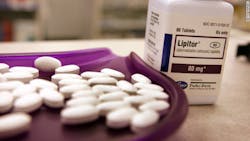Big Pharma Loses in 'Pay-To-Delay' Supreme Court Case
WASHINGTON—U.S. pharmaceutical companies can be sued for making deals that keep the cost of drugs high by delaying the creation of less expensive generic medications, the U.S. Supreme Court ruled today.
So-called "pay-for-delay" arrangements, which allow drug manufacturers to keep cheaper generics off the market for a time, are "unusual, and there is reason for concern that such settlements tend to have significant adverse effects on competition," read the decision written by Associate Justice Stephen Breyer.
The decision, while finding the payments anti-competitive, did not go so far as to find the practice illegal.
"This court declines to hold that reverse payment settlement agreements are presumptively unlawful," the court said.
But the justices said litigants could challenge the individual deals in court on a case-by-case basis.
"Courts reviewing such agreements should proceed by applying the "rule of reason," rather than under a 'quick look' approach," the Supreme Court decision said.
Equivalent of Hush Money
The U.S. government had argued before the court in March that pay-to-delay was tantamount to big drug manufacturers buying off competitors.
The Federal Trade Commission and the Justice Department argued that such arrangements are tantamount to a decision not to compete, and end up costing consumers billions of dollars each year.
The court heard the case of drugmaker Solvay, a subsidiary of Abbott Laboratories (IW 1000/118), which paid $42 million a year to three generic drug manufacturers—Par, Watson and Paddock—in exchange for their postponing until 2015 generic versions of Solvay's hormonal treatment Androgel.
The generic formulations of Androgel were to be priced at between 15% and 25% of the price of the brand name drug produced by Solvay, which stood to lose some $125 billion.
Drug makers for their part argue that the arrangement allows them sufficient time to recoup expensive research and marketing costs that they incurred with their products.
Copyright Agence France-Presse, 2013
About the Author
Agence France-Presse
Copyright Agence France-Presse, 2002-2025. AFP text, photos, graphics and logos shall not be reproduced, published, broadcast, rewritten for broadcast or publication or redistributed directly or indirectly in any medium. AFP shall not be held liable for any delays, inaccuracies, errors or omissions in any AFP content, or for any actions taken in consequence.
